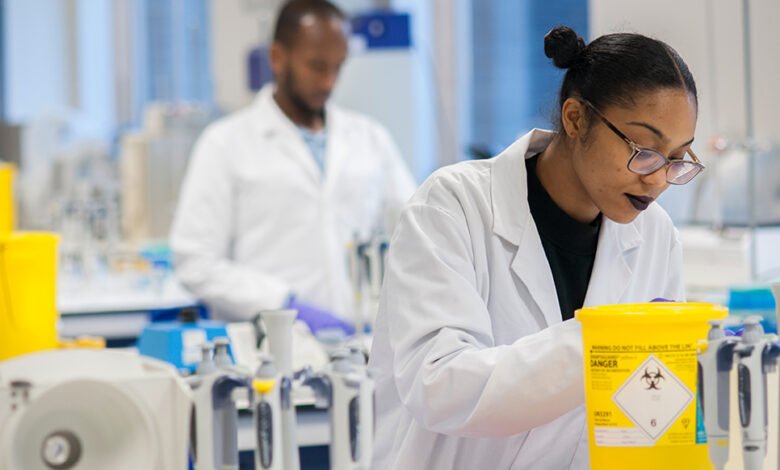The Impact of Biosciences on Our Lives

Introduction to Biosciences
Welcome to the fascinating world of Biosciences, where innovation and discovery intersect to shape the future of our lives. From revolutionizing healthcare to transforming agriculture and preserving our environment, biosciences play a pivotal role in driving advancements that impact us all. Join us on this journey as we explore the profound influence of biosciences on our world.
The Advancements in Medicine and Healthcare
The field of biosciences has revolutionized medicine and healthcare in remarkable ways. Advancements like personalized medicine have allowed for tailored treatments based on an individual’s genetic makeup, leading to more effective and targeted therapies.
Furthermore, breakthroughs in biotechnology have paved the way for innovative medical devices and diagnostics that enhance patient care and outcomes. The development of new pharmaceuticals through biopharmaceutical research has brought about life-saving treatments for various diseases.
Moreover, bioinformatics tools enable researchers to analyze vast amounts of biological data quickly, accelerating the pace of scientific discoveries in healthcare. In addition, regenerative medicine offers hope for treating previously incurable conditions by harnessing the body’s natural healing abilities.
The continuous progress in biosciences continues to drive advancements in medicine and healthcare, shaping a brighter future for global health outcomes.
Enhancing Agriculture through Biosciences
Agriculture has been revolutionized by biosciences in recent years. Through advancements in genetic engineering, crops have been developed to be more resistant to pests and diseases, leading to higher yields for farmers. These genetically modified organisms (GMOs) have helped address food security challenges by increasing production efficiency.
Biosciences have also played a crucial role in developing sustainable farming practices. By studying plant physiology and soil microbiology, scientists have created innovative solutions to improve crop nutrition and reduce the need for chemical fertilizers. This not only benefits the environment but also promotes healthier produce for consumers.
Furthermore, biosciences have enabled the development of biopesticides and biofuels derived from agricultural waste products. These eco-friendly alternatives help minimize the impact of conventional pesticides on ecosystems while reducing carbon emissions from fossil fuels.
The integration of biosciences into agriculture continues to drive innovation and sustainability in our food systems, paving the way for a more efficient and environmentally friendly future.
Environmental Benefits of Biosciences
Biosciences have significantly contributed to addressing environmental challenges by offering innovative solutions. One of the key benefits is the development of biodegradable materials that reduce plastic pollution in oceans and landfills. Scientists are also utilizing biosciences to improve wastewater treatment processes, making them more efficient and eco-friendly.
Moreover, biosciences play a crucial role in developing sustainable agriculture practices that minimize soil degradation and water contamination from chemical inputs. By harnessing genetic engineering techniques, researchers can create crops resistant to pests and diseases without relying on harmful pesticides.
Additionally, biosciences contribute to the conservation of endangered species through DNA analysis for better monitoring and protection strategies. Bioremediation techniques are being explored to clean up polluted sites using natural organisms’ capabilities to degrade contaminants effectively.
The environmental benefits of biosciences continue to evolve as researchers explore new ways to mitigate human impact on ecosystems while promoting sustainability.
Ethical Concerns and Criticisms
As with any rapidly evolving field, biosciences also come with their fair share of ethical concerns and criticisms. One major issue that often arises is the potential misuse of biotechnologies for unethical purposes. The ability to manipulate genes and create genetically modified organisms raises questions about the impact on natural ecosystems and biodiversity.
Another area of concern is the privacy and security risks associated with genetic data. As advances in genetics enable us to unlock more information about individuals’ health predispositions, there are fears about how this data could be used without consent or for discriminatory practices.
Furthermore, debates around animal testing in research labs continue to spark controversy within the bioscience community and among the public. Balancing scientific progress with ethical considerations remains a delicate tightrope walk.
Navigating these ethical dilemmas will require thoughtful discussions, robust regulations, and ongoing scrutiny to ensure that biosciences continue to benefit society while upholding moral standards.
Future Possibilities and Innovations
As we look towards the future of biosciences, the possibilities and innovations seem endless. With rapid advancements in technology, gene editing tools like CRISPR-Cas9 hold promise for treating genetic disorders and diseases more precisely than ever before.
Imagine a world where personalized medicine tailored to individual genetic makeup becomes the norm. This could revolutionize healthcare by providing targeted treatments with higher efficacy rates and fewer side effects.
Furthermore, synthetic biology opens up opportunities for creating sustainable biofuels, biodegradable plastics, and even engineered microorganisms that can clean up environmental pollutants.
In agriculture, precision breeding techniques may lead to crops that are more resilient to climate change and pests while increasing yields to feed a growing global population sustainably.
The integration of artificial intelligence with biosciences has the potential to accelerate research processes, leading to faster drug discoveries and breakthroughs in understanding complex biological systems.
The future of biosciences holds immense potential for transforming our lives in ways we have yet to imagine.
Conclusion: The Constant Evolution of Biosciences and Its Impact on Our World
The constant evolution of biosciences has undeniably shaped our world in profound ways. From advancements in medicine and healthcare that have saved countless lives to the improvements in agriculture that have increased food production, biosciences continue to revolutionize how we live and interact with our environment.
Despite some ethical concerns and criticisms surrounding certain practices within the field, the overall impact of biosciences on society cannot be ignored. The potential for future innovations is vast, promising even more groundbreaking discoveries that could further enhance human health, protect our planet, and improve overall quality of life.
As we move forward into an increasingly complex and interconnected world, it is clear that biosciences will play a crucial role in addressing some of the most pressing challenges we face as a global community. Embracing these advancements while also remaining vigilant about their ethical implications will be key to harnessing the full potential of biosciences for the benefit of all.



